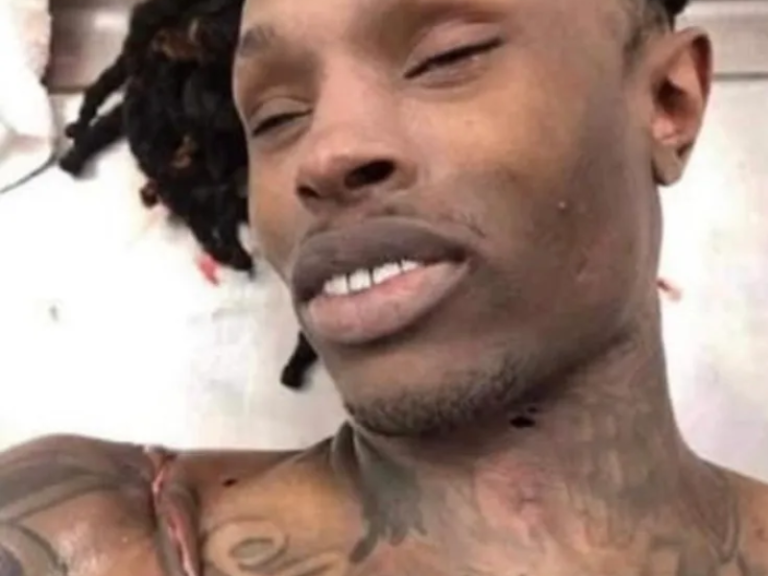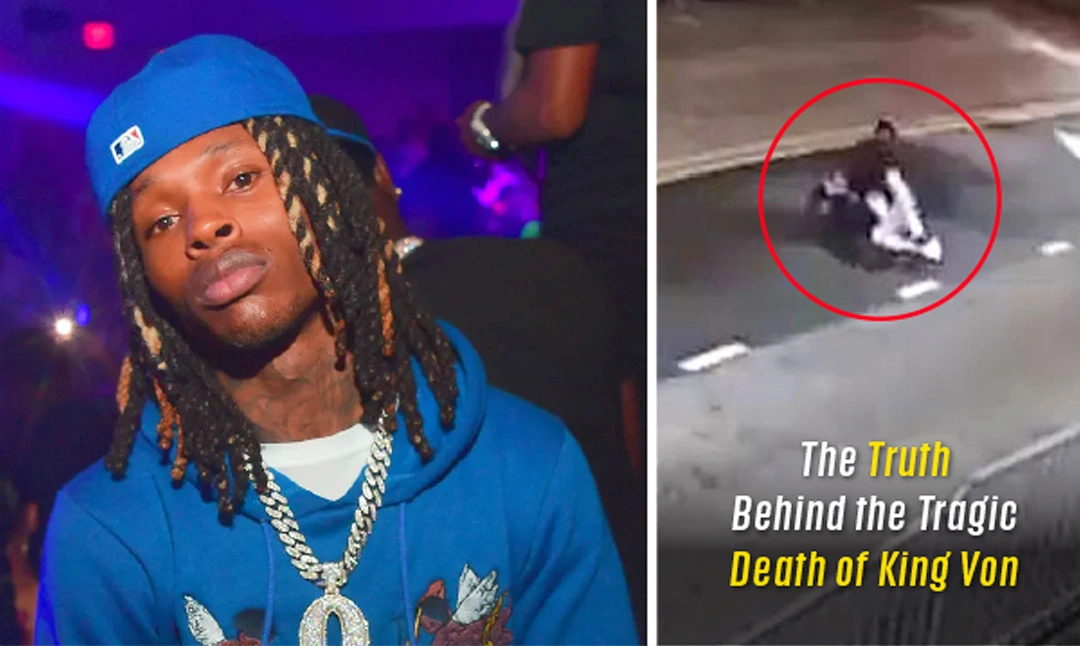Shocking Details Emerge: King Von's Autopsy Report Unveiled
Why does the autopsy of King Von remain a subject of such intense public fascination and scrutiny? The violent death of the Chicago rapper, and the subsequent examination of his body, has become a focal point for discussions about gang violence, the impact of social media, and the complexities of justice in a divided society.
On November 6, 2020, the world of hip-hop was shaken by the tragic news: Dayvon Daquan Bennett, better known as King Von, was dead. He had been shot and killed in a shooting outside of a nightclub in Atlanta, Georgia. The event sent shockwaves through the music industry and the broader community, prompting immediate and widespread mourning, tributes, and speculation about the circumstances surrounding his demise. Following the standard protocol for a homicide investigation, an autopsy was performed on King Von's body. The official findings, along with the crime scene details and the unfolding legal proceedings, have been meticulously scrutinized by law enforcement, the media, and a vast and engaged public. This scrutiny isn't merely morbid curiosity; it's a reflection of the deep emotional investment in a cultural figure whose life and art resonated with millions, particularly young people. The autopsy report, a dispassionate scientific document, became a symbolic representation of the violence that plagued his life and the city he represented.
| Category | Details |
|---|---|
| Full Name | Dayvon Daquan Bennett |
| Stage Name | King Von |
| Born | August 9, 1994, in Chicago, Illinois, USA |
| Died | November 6, 2020, in Atlanta, Georgia, USA |
| Cause of Death | Gunshot wounds |
| Nationality | American |
| Genres | Hip hop, Drill |
| Years Active | 2018 2020 |
| Labels | Empire Distribution |
| Associated Acts | Lil Durk, Polo G, FBG Duck, and others within the Chicago drill scene |
| Notable Songs | "Crazy Story," "Took Her to the O," "Slide," "Armed & Dangerous," "The Code" (feat. Polo G), "Back Again" |
| Albums and EPs | Levon James (2019), Grandson, Vol. 1 (2019), Welcome to O'Block (2020), What It Means to Be King (2022) |
| Legal Issues | Battled several legal troubles throughout his life, including a 2014 murder charge that he was later acquitted of. |
| Origin | Chicago, Illinois, USA |
| City represented | Chicago |
| Reference | Wikipedia |
The autopsy, as a legal and medical procedure, served the primary purpose of determining the cause and manner of death. In this case, the official cause of death was determined to be gunshot wounds. The autopsy report provides essential medical evidence for law enforcement to piece together the events leading up to the shooting. It also provided information about the number and location of the gunshot wounds, the trajectory of the bullets, and other details crucial for the investigation. The findings are then used in the criminal justice system to help determine culpability. While the information from the autopsy is often considered private, certain details are often released to the public in the interest of transparency, especially in high-profile cases. The precise details that emerged from King Vons autopsy became a significant component of the legal proceedings. Beyond the immediate legal implications, the autopsy report also contributed to the narrative surrounding King Von's death. It reinforced the reality of the violence that surrounded him and provided a brutal physical confirmation of the tragedy.
The circumstances of the shooting were complex, involving a confrontation outside of the Monaco Hookah Lounge in Atlanta. Reports indicate that a dispute between two groups of individuals, including King Von and his entourage, escalated into gunfire. The investigation by the Atlanta Police Department led to the arrest of multiple individuals, including Timothy Leeks, who was charged with King Von's murder. The shooting also resulted in injuries to several other people, adding to the chaotic nature of the event. The legal proceedings that followed were also closely watched by the public. The charges against the suspects, the evidence presented, and the potential sentences all became subjects of intense discussion and speculation. The justice system, in these cases, strives to determine culpability and provide a measure of closure for the victims' families and the wider community.
The cultural impact of King Von's death extended far beyond the legal and medical realms. He was a prominent figure in the Chicago drill music scene, a subgenre of hip-hop characterized by its gritty realism, violent lyrics, and often autobiographical narratives. His music often depicted the harsh realities of life in Chicago, particularly the challenges faced by young people living in impoverished and crime-ridden neighborhoods. His songs resonated with a large audience, especially young people who could relate to the struggles and experiences he described. His music became a soundtrack for a generation, and his untimely death sparked a massive outpouring of grief and tributes from fans and fellow artists. Social media platforms were flooded with messages of condolence, song dedications, and discussions about his legacy. The impact of his music has continued to be felt long after his death, with new music and posthumous releases continuing to be popular, solidifying his influence on the genre.
The Chicago drill scene itself is a complex phenomenon, and it has drawn both praise and criticism. The music often reflects the realities of violence and poverty, but critics sometimes argue that it glorifies criminal behavior and contributes to the perpetuation of violence. The role of social media in amplifying these narratives is significant. Social media platforms are used to promote music, but also for conflict. The public is exposed to the rivalries and beefs that fuel the drill scene. This exposure can lead to a heightened sense of risk and danger for the artists involved, and it can also contribute to the normalization of violence within communities. The role of the media in framing and portraying the drill scene is another important factor to consider. The way these stories are presented through news reports, documentaries, and other forms of media shapes public perceptions of the artists and their music. The balance between providing information and potentially sensationalizing violence is a difficult line to walk.
The autopsy report, by its very nature, is a factual document, but its interpretation can be subjective and influenced by various factors. Legal experts, media analysts, and fans have all analyzed the autopsy report in different ways, drawing different conclusions and perspectives. Some focused on the precise details of the gunshot wounds and the order of events. Others highlighted the wider context of the violence and the social forces at play. The public's reaction to the report was often emotionally charged, reflecting the grief and anger surrounding King Von's death. The details of the autopsy, however clinical and medical, served as a visceral reminder of the violence, loss, and the lasting impact of the events of that night in Atlanta.
The legacy of King Von is complex and multifaceted. He left behind a body of work that continues to resonate with his fans, and his impact on the drill music scene is undeniable. However, his life and death also highlight the tragic consequences of gang violence and the challenges faced by young people in underserved communities. The discussions about his life, death, and the factors that contributed to both continue to unfold. In these discussions, questions about social justice, urban violence, and the role of art are often debated. The ongoing conversation about King Von's legacy serves as a reminder of the need for critical reflection and systemic change. His story highlights the urgent need for addressing the root causes of violence and investing in the communities where his music originated.
The medias portrayal of King Von, both during his life and after his death, also played a significant role in shaping public perception. Some outlets focused on the violence, emphasizing his alleged involvement in criminal activities, while others highlighted his musical talent, his charismatic personality, and the challenges he faced. The narratives presented by the media can influence public opinion and contribute to the ongoing debates surrounding his legacy. Media representation, both positive and negative, continues to shape the understanding of King Von and his music, impacting how his death is understood by fans and the public at large. Sensationalism often prevails, especially in the wake of a tragedy.
The autopsy of King Von serves as a stark reminder of the fragility of life and the devastating consequences of violence. It is a document that offers a cold, scientific account of a tragic event, but it also holds a mirror to the complex social and cultural forces that shaped his life and death. The autopsy report is more than a medical document; it is a symbol of the violence that claimed his life and the systemic issues that fueled it. The lasting legacy of King Von extends far beyond the courtroom and the medical examiner's office. It continues to reverberate through the music, the community, and the ongoing conversations about violence, art, and justice in America.
The investigation into King Von's death involved multiple agencies and required a meticulous examination of the crime scene, witness testimonies, and forensic evidence. This thorough process aimed to establish a clear understanding of the events. The legal proceedings that followed involved the prosecution of the alleged shooter and others involved in the incident. The judicial process provided an avenue for examining the evidence and determining the responsibility for the tragedy. The complex legal proceedings that followed, and the detailed examination of the evidence, have been subjected to intense scrutiny and remain a subject of ongoing discussion.
The debate around the role of violence in hip-hop is also inseparable from the story of King Von's death. His music, like much drill music, often reflects the realities of urban violence, but some critics argue that it glorifies criminal behavior. The debate often centers on the responsibility of artists to address the societal issues that they portray in their music. Many defend the authenticity of the art, arguing that the music provides a voice for those who live in violent environments. Others argue that the music can also have a negative impact, potentially fueling more violence or contributing to the desensitization of listeners. This ongoing dialogue has taken on new intensity with King Von's death.
The case of King Von's autopsy raises fundamental questions about the role of violence in society, the impact of social media, and the complexities of the criminal justice system. The incident has sparked discussions about the responsibility of artists, the power of the media, and the challenges of creating safer communities. The impact extends into questions of art, justice, and the intersection of music and violence. The circumstances surrounding his death and the autopsy serve as a somber case study, raising vital questions that resonate far beyond the music industry, echoing within broader societal debates.

